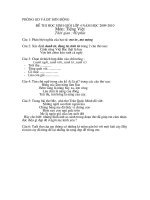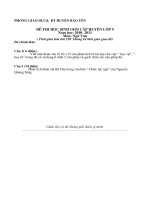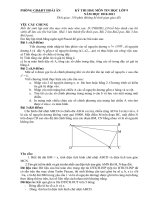de thi hsg cap huyen mon anh 9
Bạn đang xem bản rút gọn của tài liệu. Xem và tải ngay bản đầy đủ của tài liệu tại đây (125.78 KB, 6 trang )
Phòng GD-ĐT Văn Giang
Trường THCS Mễ Sở
Người soạn: Nguyễn Thị Vui.
ĐỀ THI HỌC SINH GIỎI HUYỆN
Năm học 2010- 2011
(Chú ý: Thí sinh làm bài vào giấy thi. Phần trắc nghiệm chỉ ghi số câu hỏi và phương án chọn
A, B, C hoặc D. Phần tự luận làm đầy đủ theo yêu cầu của đề bài)
Question I: a.Choose one word whose underlined part is pronounced differently
from the others in each group. (5 pts)
1. A. Tamil B. baggy C. casual D. article
2. A. cupboards B. cigarettes C. maps D. ghosts
3. A. great B. bread C. break D. steak
4. A. dropped B. looked C. laughed D. raised
5. A .cook B. flood C. book D. woman
b. Choose the word that has the main stress in a different position
from the others: (5 pts)
6. A. necessary B. inform C. interest D. dangerous
7. A. control B. foolish C. broken D. greedy
8. A. movies B. answer C. article D. machine
9. A. agree B. internet C. radio D. travel
10. A. order B. customer C. museum D. brutal
Question II. Choose the word or phrase that best completes each sentence (10 pts)
1. He took his seat quietly_____ their conversation.
A. in order that not to disturb B. so as to disturb
C. so as not to disturb D. in order not disturb
2. The ________noise startled the woman.
A. frightened B. frighten C. frightening D. fright
3. His shoes are very dirty. They need________ .
A. cleaning B. cleaned C. to clean D. clean
4. His pronunciation causes me a lot of________ .
A. difficulties B. difficult C. difficulty D. difficultly
5. _____ time you put your toys away.
A. It’s the B. There’s C. It’s D. There is a
6. I caught ________of a lion lying under the tree, and my heart jumped.
A. view B. scene C. look D. sight
7. The students are used to ________in the school library.
A. work B. working C. worked D. being worked
8. I’d rather ________until Jill comes back. Let’s go home.
A. not to wait B. not wait C. have not waited D. I didn’t wait
9. We tried a lot of hotels, but ________of them had any free rooms.
A. neither B. none C. no D. not
10. You want to address an envelope to a whole family. You write:_____ .
A. Mr. and Mrs. Wilson and family B. Family Wilson
C. Family Mr. & Mrs. Wilson D. Wilson’s family
Question III: Each of the following sentences has an error marked A, B, C or D.
Identify it. (10p)
1. I suggested that you taking his advice to treat your cough.
A B C D
1
2. The pollution of the sea can be the result of careless or dumping of waste.
A B C D
3. The bridge was hitting by a large ship during a sudden storm last week.
A B C D
4. If you took more exercise, you might feel healthily.
A B C D
5. A daily newspaper was published in Germany in 1650, didn’t it?
A B C D
6. I think it is necessary to students to wear uniforms when they are at school.
A B C D
7. Though being ill, Mr. Ba went to the meeting last Monday.
A B C D
8. There was never any secret among my sister and me when we were growing up.
A B C D
9. It was very nice of you inviting me to your party.
A B C D
10. I looked all over the house for her, but I couldn’t find her nowhere.
A B C D
Question IV: Provide the correct form of the words in brackets. (10 pts)
1. The _____ are scheduled to take off at 15:00 and 15:30. (FLY)
2. It was the most _______ visit to Hue Citadels. (EDUCATE)
3. There were 50 ______in the talent contest. (COMPETE)
4. Sorry about the mistake, I ____ the instructions you gave me. (UNDERSTAND)
5. His ________has not improved much. (BEHAVE)
6. She has an ________command of the language. (IMPRESS)
7. It was extremely ________of you to leave your library books on the bus. (CARE)
8. She always listens ________to what she is told. (ATTENTION)
9. This knife is _________ . It can’t cut anything. (USE)
10. There is no easy ________to the problem. (SOLVE)
Question V. Read the following passage and decide which option A, B, C or D best
fits each space (10 points).
POLAR ADVENTURER
In March 1999, Amyr Klink, a Brazilian yachtsman and polar adventurer, became
the first man to circle Antarctica while staying south of 50 degrees latitude. He took the
most dangerous sea route in the world. Klink was already _(1)____ known because in
1984 he had rowed across the Atlantic in a small boat. The book which he wrote, based
on his _(2)____ on that trip, had by then _(3)_____ millions of copies.
For his polar adventure, Klink built his _(4)____ boat. He _(5)____ off in 1998
from South Georgia and he arrived back there 88 days later-although he _(6)____
eleven of those days on dry land in Antarctica. He did not stop there out of necessity,
but because he wanted to see the Antarctic Peninsula.
Klink knew that his _(7)____ would be dangerous. On the way he had to be
careful to (8)_____ huge floating blocks of ice. These icebergs, as they are called, were
everywhere. As Klink knew that any rescue mission would have been impossible in the
rough sea, he did not bother to take a life-boat.
2
When he sailed into (9)_____winds 750 miles south of Tasmania, he met waves
that were twenty-five meters high. This meant staying awake most of the time. He only
managed to sleep for twenty- minute periods at a stretch. But he succeeded in the end,
_(10)____ all the difficulties that he had to face.
1. A. really B. widely C. broadly D. thoroughly
2. A. events B. incidents C. happenings D. experiences
3. A. sold B. printed C. bought D. produced
4. A. proper B. individual C. own D. single
5. A. set B. put C. left D. got
6. A. passed B. lived C. spent D. remained
7. A. excursion B. tour C. voyage D. cruise
8. A. expect B. avoid C. escape D. refuse
9. A. fast B. strong C. heavy D. hard
10. A. as far as B. apart from C. according to D. in spite of
Question VI: Fill in each gap with one suitable word to complete the following
passage. (10 pts)
About twenty percent of the world’s present energy already (1)________ from
the sun in one form or another. Special devices have already been made to (2)_____ on
the roofs of houses and flats to (3)______ the sun’s ray and thus heat water.
Thousands (4)________ these devices are now being used to provide
(5)________ in houses throughout the United States while more (6)______ a million
solar water-heating units (7)______already been built in houses in Japan. Other
purposes for which solar energy is at present being used include the removal of salt
(8)_____ seawater and sewage disposal. For most people (9)______ developing
countries, the need is not for air- conditioners or central heating but for cheap ways of
(10)_____ food, drying crops and lighting houses.
Question VII. Read the following passage then answer the questions below (10 pts)
Every child in Great Britain between the age of five and fifteen must attend
school. There are three main types of educational institutions: primary elementary
schools, secondary schools and universities.
State schools are free, and attendance is compulsory. Morning school begins at
nine o’clock and lasts until half past four. School is open five days a week. On
Saturdays and Sundays there are no lessons. There are holidays at Christmas, Easter and
in summer. In London as in all cities there are two grades of state schools for those who
will go to work at fifteen primary schools for boys and girls between the ages of five
and eleven, and secondary schools for children from eleven to fifteen years.
The lessons are reading, writing, the English language, English literature, English
history, geography, science, nature study, drawing, painting, singing, woodwork and
drill (physical training).
1. Is it compulsory for all children in Great Britain to attend schools?
2. On which days are there lessons for children?
3. What subjects do children study at school?
4. When do children have their holidays?
5. How old are secondary school children in Great Britain?
3
Question VIII: Complete the second sentence in such a way that it is almost the
same as the first. (10 pts):
1. Although his father took a taxi, he still arrived late for the meeting.
→Despite……………………………….…......................................................…..
2. It is ages since she last visited her parents.
→She ………………………………............................................................……..
3. Handicapped people find shopping in supermarkets difficult.
→It is…………………...........................................................................................
4. It isn’t necessary to book tickets for the show in advance.
→You need ……………...................................................................……………..
5. We got lost because we didn’t have a map.
→Had……………….........................................................................……………..
6. The cake was so hard that I could not eat it.
→It was………………......................................................................……………..
7. We couldn’t drive because of the fog.
→The fog prevented………......................................................................………..
8. They are going to tune my piano tomorrow.
→I am……………............................................................................................…..
9. Nobody has watered the flowers in the garden for many weeks.
→The flowers........................................................................................................
10. Every day my younger brother spends two hours learning English.
→ Every day it takes...............................................................................................
Question IX: Use the cue words in brackets to write a passage about the
advantages of the television (about 120 words). (15 pts)
(news, education, music, movies, research, cartoons, weather forecast, plays, training
programmes, concerts, etc.)
..................................Hết ................................
Họ và tên thí sinh: .......................................................SBD: .....................
Chữ ký của giám thị 1: …….……….… Chữ ký của giám thị 2: …………………
HƯỚNG DẪN CHẤM VÀ ĐÁP ÁN
Question I. Total 10 points, (one correct answer: 1 point)
1. D 2. A 3. B 4. D 5. B
6. B 7. A 8. D 9. A 10. c
4
Question II. Total 10 points, (one correct answer: 1 point)
1. C 2. C 3. A 4. A 5. C
6. D 7. B 8. B 9. B 10. A
Question III: Total 10 points, (one correct answer: 1 point)
1. B
2. C
3. A
4. D
5. D
6. B
7. A
8. B
9. C
10. D
Question IV: Total 10 points, (one correct answer: 1 point)
1. FLIGHTS
2. EDUCATIONAL
3. COMPETITORS
4. MISUNDERSTOOD
5. BEHAVIOUR
6. IMPRESSIVE
7. CARELESS
8. ATTENTIVELY
9. USELESS
10. SOLUTION
Question V. Total 10 points, (one correct answer: 1 point)
1. B. 2. D. 3. A. 4. C. 5. A.
6. C. 7. C. 8. B. 9. B. 10. D.
Question VI: Total 10 points, (one correct answer: 1 point)
1. comes 2. put/ place/fix 3. collect / use/ catch 4. of
5. energy / electricity/power 6. than 7. have 8. from 9. in 10. cooking
Question VII: Total 10 points, (one correct answer: 2 points)
1. Yes, it is.
2. There are lessons for children from Monday to Friday/ on five days.
3. They study reading, writing, the English language, English literature, English history,
geography, science, nature study, drawing, painting, singing, woodwork and drill.
4. They have holidays at Christmas, Easter and in summer.
5. They are from 11 to 15 years old.
Question VIII: Total 10 points, (one correct answer: 1 point)
1. Despite (his father’s) taking/ having taken a taxi, he still arrived late for the meeting.
2. She has not visited her parents for ages.
3. It’s difficult for handicapped people to shop/ go shopping in supermarkets.
4. You need not book tickets for the show in advance.
5. Had we had a map, we wouldn’t have got lost.
6. It was such a hard cake that I could not eat it./ It was so hard a cake that I could not
eat it.
7. The fog prevented us from driving.
8. I am going to have my piano tuned tomorrow.
9. The flowers in the garden haven’t been watered for many weeks.
5









